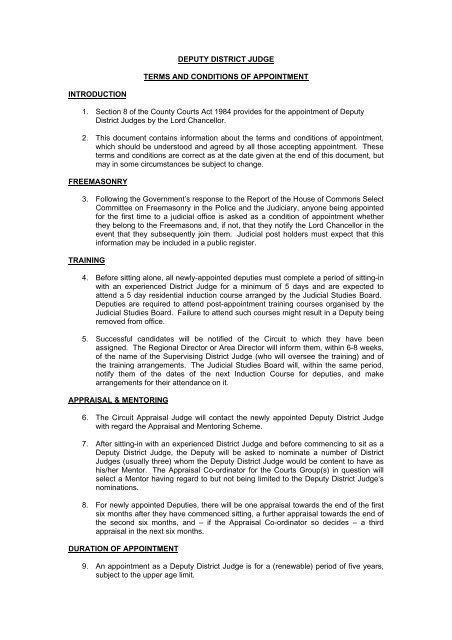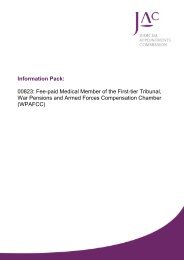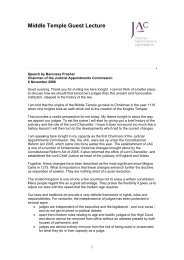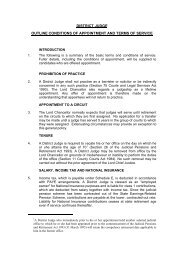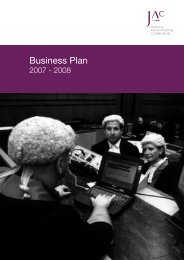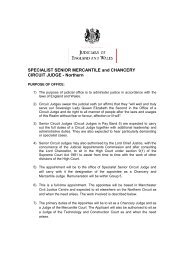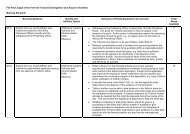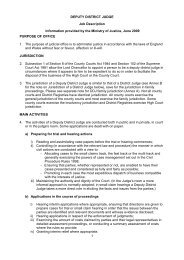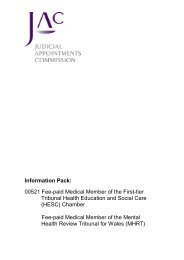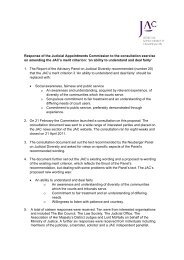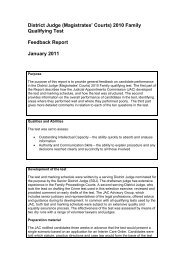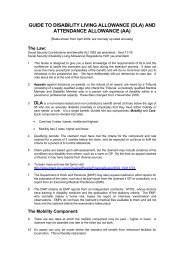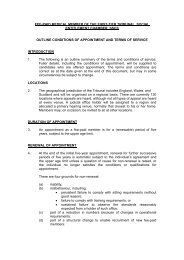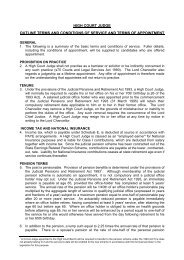deputy district judge - Judicial Appointments Commission - Judiciary
deputy district judge - Judicial Appointments Commission - Judiciary
deputy district judge - Judicial Appointments Commission - Judiciary
You also want an ePaper? Increase the reach of your titles
YUMPU automatically turns print PDFs into web optimized ePapers that Google loves.
DEPUTY DISTRICT JUDGETERMS AND CONDITIONS OF APPOINTMENTINTRODUCTION1. Section 8 of the County Courts Act 1984 provides for the appointment of DeputyDistrict Judges by the Lord Chancellor.2. This document contains information about the terms and conditions of appointment,which should be understood and agreed by all those accepting appointment. Theseterms and conditions are correct as at the date given at the end of this document, butmay in some circumstances be subject to change.FREEMASONRY3. Following the Government’s response to the Report of the House of Commons SelectCommittee on Freemasonry in the Police and the <strong>Judiciary</strong>, anyone being appointedfor the first time to a judicial office is asked as a condition of appointment whetherthey belong to the Freemasons and, if not, that they notify the Lord Chancellor in theevent that they subsequently join them. <strong>Judicial</strong> post holders must expect that thisinformation may be included in a public register.TRAINING4. Before sitting alone, all newly-appointed deputies must complete a period of sitting-inwith an experienced District Judge for a minimum of 5 days and are expected toattend a 5 day residential induction course arranged by the <strong>Judicial</strong> Studies Board.Deputies are required to attend post-appointment training courses organised by the<strong>Judicial</strong> Studies Board. Failure to attend such courses might result in a Deputy beingremoved from office.5. Successful candidates will be notified of the Circuit to which they have beenassigned. The Regional Director or Area Director will inform them, within 6-8 weeks,of the name of the Supervising District Judge (who will oversee the training) and ofthe training arrangements. The <strong>Judicial</strong> Studies Board will, within the same period,notify them of the dates of the next Induction Course for deputies, and makearrangements for their attendance on it.APPRAISAL & MENTORING6. The Circuit Appraisal Judge will contact the newly appointed Deputy District Judgewith regard the Appraisal and Mentoring Scheme.7. After sitting-in with an experienced District Judge and before commencing to sit as aDeputy District Judge, the Deputy will be asked to nominate a number of DistrictJudges (usually three) whom the Deputy District Judge would be content to have ashis/her Mentor. The Appraisal Co-ordinator for the Courts Group(s) in question willselect a Mentor having regard to but not being limited to the Deputy District Judge’snominations.8. For newly appointed Deputies, there will be one appraisal towards the end of the firstsix months after they have commenced sitting, a further appraisal towards the end ofthe second six months, and – if the Appraisal Co-ordinator so decides – a thirdappraisal in the next six months.DURATION OF APPOINTMENT9. An appointment as a Deputy District Judge is for a (renewable) period of five years,subject to the upper age limit.
RENEWAL OF APPOINTMENT10. At the end of the initial five-year appointment, renewal for further successive periodsof five years is automatic subject to the individual’s agreement and the upper age limitunless a question for non-renewal is raised, or the individual no longer satisfies theconditions or qualifications for appointment.11. There are seven grounds for non-renewal:a. Incapacity;b. misbehaviour; includingc. persistent failure to comply with sitting requirements (without good reason);d. failure to comply with training requirements;e. sustained failure to observe the standards reasonably expected from a holder ofsuch office;f. part of a reduction in numbers because of changes in operational requirements;andg. part of a structural change to enable recruitment of new Deputy District Judges.12. All decisions not to renew on grounds (a) – (e) are taken by the Lord Chancellor withthe concurrence of the Lord Chief Justice. Such decisions are taken following aninvestigation conducted by a <strong>judge</strong>, who will report to the Lord Chancellor and theLord Chief Justice.13. All decisions not to renew on grounds (f) or (g) will be on a “first in, first out” principle,and the decision to use such grounds and the extent to which they will be used will betaken by the Lord Chancellor with the concurrence of the Lord Chief Justice.14. Deputy District Judges may choose to end their appointment by resignation or bydeclining to accept renewal on completion of a term.UPPER AGE LIMIT15. The Lord Chancellor will not normally extend the appointment of a Deputy DistrictJudge beyond the age of 70.SITTINGS16. This appointment carries an obligation to sit at any courts centre in the country in theexercise of the relevant jurisdiction. It should not be seen as conferring anyexpectation of any given level of future sittings, nor of any level of future sittings at aparticular location.17. The Lord Chancellor, in consultation with the Lord Chief Justice, has decided that allfee-paid office holders in this jurisdiction should be offered and required to sit aminimum of 15 days a year. A Deputy District Judge may be expected to sit for morethan the minimum subject to the availability of work and individual circumstances. ADeputy District Judge may sit up to a maximum of 50 days a year. These figures maybe subject to general adjustment from time to time, in the light of operationalcircumstances: any changes will be announced. The Lord Chancellor and the LordChief Justice regard it as the personal responsibility of a Deputy District Judge toensure that they meet their sitting obligations unless, in exceptional circumstances, itis rendered impossible by the performance of other public duties.18. A Deputy District Judge should plan to make him or herself available for judicialbusiness between the hours of 9.30 am and 4.30 pm. However, practice can varyand Deputy District Judges should observe the requirements of the courts. It is likelythat, besides hearings, a Deputy District Judge will be expected to complete an
amount of judicial paperwork which will be allocated, on the instructions of the DistrictJudge, by courts staff.OTHER JUDICIAL WORK19. There is no objection in principle to an individual holding more than one judicialappointment.20. The holder of full-time judicial office may, subject to suitability, sit as a fee-paidDeputy District Judge and will be required to give the minimum 15 days. However,the Lord Chancellor and the Lord Chief Justice expect holders of salaried judicialoffice to give priority to the duties of that office and arrangements for other sittings asa Deputy District Judge are subject to agreement between the office-holder, theCourts Service and the <strong>Judicial</strong> Office for England & Wales.CONFLICTS OF INTEREST21. The governing principle is that no person should sit in a judicial capacity in anycircumstances, which would lead an objective onlooker with knowledge of all thematerial facts reasonably to suspect that the person might be biased. As a generalprinciple therefore, a legal practitioner ought not to sit as a Deputy District Judge, orto appear, at a county courts or elsewhere if he or she is liable to be embarrassed ineither capacity by doing so.22. As a general rule, it is undesirable for fee-paid judicial office holders who are legalpractitioners to sit at courts where he or she or any partner or employee of theirsregularly practises. This is to help avoid them being assigned to adjudicate in a case(or several cases) from which they would have to stand down. If a fee-paid judicialoffice holder who is a legal practitioner does sit at such a courts then the LordChancellor and the Lord Chief Justice regard it as the personal responsibility of thejudicial office holder (and not that of the courts staff) to ensure, as far as possible,that he or she avoids any potential conflict of interest which might require him or herto stand down from a particular case.23. Fee-paid judicial office holders: -(i)(ii)(iii)should not sit in cases involving their own firms or clients or otherwise where todo so could give rise to the perception of prejudice in the administration ofjustice.should comply with the existing case law governing pecuniary or other interestsin deciding whether to declare an interest in, or to stand down from, a particularcase e.g. “Locabail (UK) Ltd v Bayfield Properties Ltd and Another [2000] Q.B451; In re Medicaments and Related Classes of Goods (No 2) [2001] 1 W.L.R700; and Lawal v Northern Spirit Limited [2003] UKHL 35”.should not sit on a case if they have a personal, professional or pecuniary interestin that case, or if any business or practice of which they are members in anycapacity have such an interest.24. Fee-paid judicial office holders are expected to refrain from any activity, political orotherwise, which would conflict with their judicial office or be seen to compromisetheir impartiality, having regard for example to the comments of the Courts of Appealin the case of Locabail. They should also be aware of the risk of a perceived lack ofimpartiality arising from published articles or public pronouncements, etc. (Timmins vGormley [(2000) 2 WLR 870)]. Fee-paid judicial office holders should exercisecaution in any reference to their appointment on, for example, letterheads or inchambers advertising literature. Fee-paid holders hold office only when they areserving judicially and should not use their appointment as a means of pursuingpersonal, professional or commercial advantage.
JUDICIAL CONDUCT25. The public both deserves and expects the highest standards of conduct from thosewho hold judicial office. Without prejudice to the paragraphs below, a Deputy DistrictJudge should notify the Lord Chief Justice at the earliest opportunity if they are awareof any matters relating to conduct which may affect their position or may reflect on thestanding and reputation of the judiciary at large.26. A Deputy District Judge should also notify the Lord Chief Justice if they get intoserious financial difficulties, particularly if legal proceedings appear to be likely to be,or have actually been, initiated. They should also inform the Lord Chief Justice of anycomplaint made against them by their professional body, whether it relates to theirprofessional or judicial capacity. Office holders must notify the Lord Chief Justice ifthey are involved, or likely to be involved in any courts proceedings.27. Where, either before or after he/she has commenced service, an office holder iscautioned for, or charged with, any criminal offence, other than a parking or speedingoffence without aggravating circumstances, i.e. an offence for which a period ofdisqualification, or at least 6 penalty points, are imposed, or which results in a total ofmore than 6 currently accumulated penalty points, he/she should report the matter atonce to the Lord Chief Justice and should keep him informed of the progress andoutcome of the case. Failure to do so could itself in some cases amount prima facieto misbehaviour. Convictions for some offences, including some motoring matters,need not necessarily be regarded as being incompatible with continuing to holdjudicial office. However, if a judicial office holder were convicted of a grave offence,for instance one involving violence to persons, dishonesty or moral turpitude, the LordChancellor and the Lord Chief Justice would regard themselves as having cause toconsider the exercise of their powers to remove the individual from office on thegrounds of misbehaviour; and the Lord Chancellor and the Lord Chief Justice regarda conviction for an offence of driving while under the influence of alcohol or drugs asso grave as to amount prima facie to misbehaviour.28. The public must be entitled to expect all <strong>Judicial</strong> office holders to maintain at all timesproper standards of courtesy and consideration. They do not regard behaviour whichcould cause offence, particularly on racial or religious grounds, or amounting tosexual harassment, as consistent with the standards expected of those who holdjudicial office. A substantiated complaint of conduct of this kind, whether or notprevious complaints have also been made, is in their view capable of being regardedas misbehaviour.29. The exercise of the Lord Chancellor’s and the Lord Chief Justice’s disciplinary powersare governed by regulations made by the Lord Chief Justice under sections 115 and117 of the Constitutional Reform Act 2005. They enable any observations which theoffice holders may wish to make on the matter to be taken fully into account. TheLord Chancellor and the Lord Chief Justice will not consider the exercise of thepowers vested in them in respect of judicial conduct without serious cause and themost careful deliberation.REMOVAL FROM OFFICE30. The Lord Chancellor may if he thinks fit terminate the appointment of the DeputyDistrict <strong>judge</strong> on specified grounds. There are five grounds for removal fromappointment:a) Incapacity;b) misbehaviour; includingc) failure to comply with training requirements;d) persistent failure to comply with sitting requirements (without good reason);and
e. sustained failure to observe the standards reasonably expected from a holderof such office.31. All decisions to remove are taken by the Lord Chancellor with the concurrence of theLord Chief Justice. Such decisions are taken in accordance with the procedurescontained in the Regulations referred to at paragraph 29 above.FEES, INCOME TAX AND NI CONTRIBUTIONS32. The post is non-salaried and non-pensionable. A Deputy District Judge will receive afee for each day sat.33. It is a general principle that Crown servants in receipt of a salary do not normallyreceive additional remuneration for public offices held, or work undertaken,concurrently on a fee-paid basis. While there may be circumstances (e.g. where itcan be demonstrated that the judicial sittings are undertaken during a period ofunpaid leave from the primary office or employment) where daily sitting fees may bepayable, in general salaried public office holders and public servants paid by CentralGovernment will receive no remuneration for any fee-paid judicial offices heldconcurrently.34. Fee-paid judicial office-holders who are practitioners or private sector employees areexpected to be open and transparent with their firm, chambers or primary employer interms of the arrangements, including financial arrangements, relating to their judicialappointment. It is essential that remuneration arrangements, and any uncertaintiessurrounding particular individual circumstances, should be resolved at the time ofappointment or at the earliest opportunity following a material change ofcircumstances during a period of service. The same expectations apply to those feepaidjudicial office-holders who are employed by, or are officers of, local government.35. Deputy District Judges are regarded as holders of an office for tax and NationalInsurance purposes. Fees payable will, as a result, be chargeable to tax underSchedule E of the Taxes Act and subject to Class 1 National Insurance contributions.These liabilities will be deducted via the Ministry of Justices’ payroll system and thenet fee paid to the office-holder. Fees are not subject to VAT.36. It would be helpful and avoid confusion, if in any correspondence with HM Revenue &Customs regarding fees and allowances attributable to any fee-paid office, and withHM Revenue & Customs National Insurance Contributions Office regardingdeferment of payment or refund of National Insurance contributions, office holderswould give as the address for the fee paying authority, the appropriate tribunal andmention the fact that they are office holders, and not employees of the Ministry ofJustice.TRAVELLING AND NIGHT SUBSISTENCE ALLOWANCES37. Travelling expenses and in certain circumstances night subsistence allowances maybe payable in connection with sittings, attendance at training courses etc. A DeputyDistrict Judge travelling by rail to a centre where they have been asked to sit will beentitled to first class rail fare and the cost of taxis where necessary at each end. Ifthey use their own car, they will be entitled to a mileage allowance at rates fixed fromtime to time by the Department. For every night on which it is necessary for a DeputyDistrict Judge to stay away from home, he or she will be entitled to a nightsubsistence allowance. Details of the current rates of mileage and night subsistenceallowances will be notified to the Deputy District Judge by the staff of Her Majesty’sCourts Service. Details of the rules governing the payment of these allowances willbe supplied by the Area Director’s Office. The rules governing and rates of theseallowances may change from time to time, and any such changes will be notified. HMRevenue & Customs tax rules governing the tax treatment, and rates, of theseallowances may also change and any such changes will be notified to office holders.
MATERNITY, PATERNITY AND ADOPTION LEAVE AND STATUTORY SICK PAY38. Fee-paid judicial office holders are entitled to maternity, paternity and adoption leaveand Statutory Sick Pay. Details of the operation of these entitlements will be providedto office holders as appropriate.MEDIA GUIDANCE39. Guidance on relations with the media will be provided by the <strong>Judicial</strong>Communications Office (JCO). The JCO provides communications support to judicialoffice holders in England and Wales (including salaried and fee-paid <strong>judge</strong>s, tribunalmembers and magistrates). This includes advice on media issues such as misreportingand requests for interviews, as well as an external judicial website, anintranet and a newsletter for the judiciary. The JCO is based in the Royal Courts ofJustice, is accountable to the Lord Chief Justice and is independent of anyGovernment press office. The JCO's media team is available on 020 7073 4852, fax020 7947 6544 or e-mail press.enquiries@judiciary.gsi.gov.uk. The out of hourspager number is 07659 550652.Ministry of JusticeJune 2009


